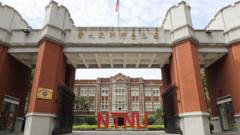In an unprecedented political maneuver, Taiwan is conducting a historic recall vote that could reshape its legislative power structure. This movement, labeled as the "Great Recall," has seen over 30 lawmakers targeted, primarily from the Kuomintang (KMT) party, which has been criticized for its perceived closeness to China. This electoral action has escalated political tensions in a country already divided over its relationship with Beijing.
Taiwan's Historic Recall Vote Targets Pro-China Lawmakers

Taiwan's Historic Recall Vote Targets Pro-China Lawmakers
A controversial recall vote in Taiwan aims to unseat lawmakers linked to perceived pro-China sentiments, with significant implications for the political landscape.
The roots of this recall initiative date back to the January 2024 elections, which resulted in William Lai from the Democratic Progressive Party (DPP) winning the presidency while the opposition, dominated by the KMT, claimed a majority in the parliament, the Legislative Yuan. This led to a standoff where the KMT, alongside smaller parties, has consistently blocked initiatives proposed by the DPP, causing public frustration.
In response, the Bluebird Movement emerged in May 2024, a grassroots effort aimed at ousting KMT lawmakers believed to be aligning with China's interests. The movement gained momentum after a group of KMT lawmakers visited China, igniting suspicions of foreign influence. Activists have since launched petitions to initiate recall votes against several KMT representatives, prompting counter-petitions from KMT supporters targeting some DPP lawmakers.
The current vote is set for 24 districts where citizens will decide whether to recall their legislative representatives. To succeed, the vote must see more than 25% voter turnout and a majority in favor for individual lawmakers to be ousted. The potential success of this recall could tilt the legislative power balance further in favor of the DPP, which had previously sought to distance itself from the recall movements but has now expressed support.
In the face of the unfolding situation, the KMT has accused the DPP of orchestrating the Great Recall as a means to invalidate election results and consolidate power. Conversely, Lai has urged his supporters to engage actively with the recall movement, emphasizing the need to protect Taiwan’s sovereign status.
Throughout this period, tensions have been palpable, with Beijing watching closely and accusing Taiwan's leaders of undermining democracy to suppress dissent.
As Taiwan prepares for this landmark vote, the outcomes will not only influence legislative dynamics but also signal the public's sentiment on its political alignment with China and issues of sovereignty.
The eyes of the world are on Taiwan as voters head to the polls, with the echoes of these decisions likely to resonate long into the future.
In response, the Bluebird Movement emerged in May 2024, a grassroots effort aimed at ousting KMT lawmakers believed to be aligning with China's interests. The movement gained momentum after a group of KMT lawmakers visited China, igniting suspicions of foreign influence. Activists have since launched petitions to initiate recall votes against several KMT representatives, prompting counter-petitions from KMT supporters targeting some DPP lawmakers.
The current vote is set for 24 districts where citizens will decide whether to recall their legislative representatives. To succeed, the vote must see more than 25% voter turnout and a majority in favor for individual lawmakers to be ousted. The potential success of this recall could tilt the legislative power balance further in favor of the DPP, which had previously sought to distance itself from the recall movements but has now expressed support.
In the face of the unfolding situation, the KMT has accused the DPP of orchestrating the Great Recall as a means to invalidate election results and consolidate power. Conversely, Lai has urged his supporters to engage actively with the recall movement, emphasizing the need to protect Taiwan’s sovereign status.
Throughout this period, tensions have been palpable, with Beijing watching closely and accusing Taiwan's leaders of undermining democracy to suppress dissent.
As Taiwan prepares for this landmark vote, the outcomes will not only influence legislative dynamics but also signal the public's sentiment on its political alignment with China and issues of sovereignty.
The eyes of the world are on Taiwan as voters head to the polls, with the echoes of these decisions likely to resonate long into the future.




















